Have you ever wondered how do chickens show affection? Owning a flock of chickens is one of the best ways to have your own fresh eggs. They don’t take up much space, and they help to get rid of insects in your yard.
But do backyard chickens make good pets? Chickens are very social animals and form friendships within the flock. They also form special bond with their human owners. Learn more about how your feathered friends might show their love for you.
Table of Contents
- The Social Lives of Chickens
- Chicken Friendships
- Chickens show their love and affection for you in a variety of ways.
- Signs That Let You Know Your Chickens Are Happy
- How to Gain a Chicken’s Affection
- Here are some traits to look for in a friendly chicken:
- FAQs
- More From The Farm
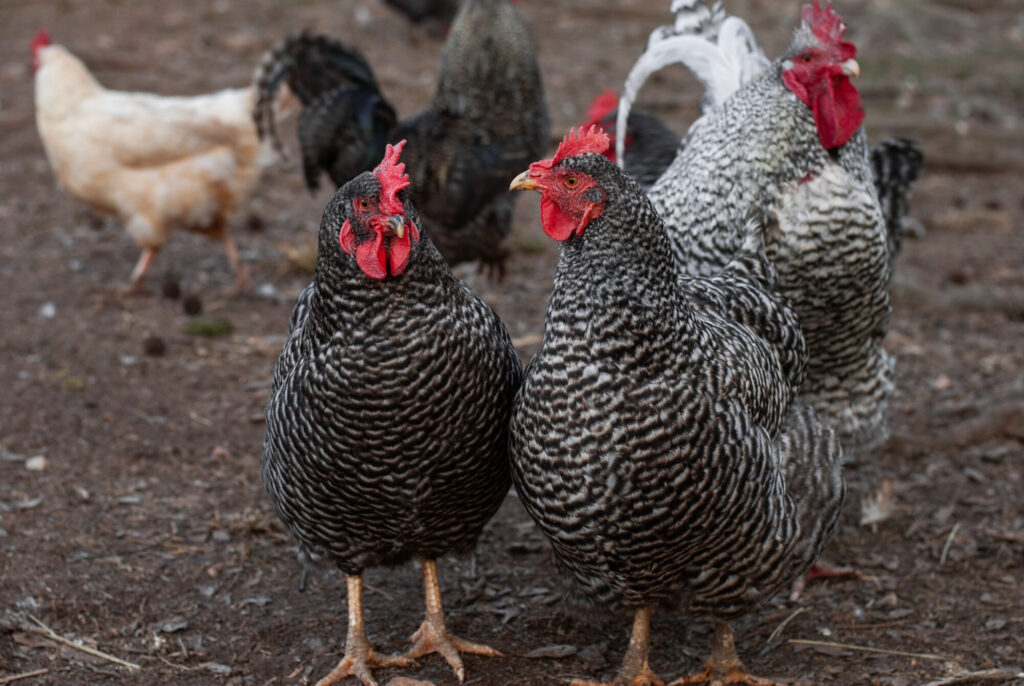
The Social Lives of Chickens
Chickens live in groups called flocks and will establish a social hierarchy among their flock mates. This type of social behavior helps every bird to know their place within the flock’s social rankings.
They communicate with each other and will often form a strong bond with one or more members of the flock. You can tell who they prefer by their physical contact with the other bird.
They’ll groom each other, share food, and even take dust baths together. Sometimes you’ll hear them giving gentle clucks to their friends to communicate with them and let them know there is food or something to be alert to.
On the contrary, you’ll also be able to tell if they don’t like a flock member by their body language. They will chase, peck, or even brawl with another chicken over a food source or personal space. Chickens at the top of the pecking order are generally more aggressive than the ones on the lower tier.
For example, a dominant rooster is always watching and even attacking other weaker roosters in the flock. They can even be bullies! Watching this behavior within your flock will help you to have a good idea of its social structure.
Chicken Friendships
Just like people, chickens will pick out a best friend within the flock and spend a lot of quality time with them. They will look for food together, dust bathe together, groom each other, and even roost next to each other at night.
If a chicken were to lose her best friend, she could become very depressed and lonely. This is why it’s always a good idea to have multiple chickens in your flock. Having a group will ensure that they are always having their social needs met.
Another common behavior you’ll see among besties is they will preen beside each other. Preening is the process of distributing oil all over their feathers with their beak. They do this to protect the feathers from water and to keep them shiny.
This is a very vulnerable moment for the chickens because they are focused on their self-care. Preening beside another hen displays trust and affection. Watch which particular hen your girl likes to preen with and you’ll know who they prefer.
How Do Chickens Bond With Humans?
*This post may contain affiliate links which means I make a small commission at no extra cost to you. Read my full disclosure here.*
You may be wondering how chickens show affection to you. Being the social creature they are, they also form bonds with humans. Chickens can recognize faces, and voices, and will even recognize your routines.
Chickens show love to humans by running to you, preening next to you, sitting in your lap, gently pecking you, allowing you to pet or groom them, following you around, and lightly clucking at your feet.
If you regularly spend a little time with them and bring them treats, they will learn to trust you and enjoy being around you. This is why I love raising my flock from baby chicks. Raising them so you helps them to be used to me from birth and also helps them to establish a bond with me.
Likely you will form a very special bond with a couple of chickens within your flock. I call these a pet chicken. They are the ones who especially love your presence and will enjoy spending time with you.
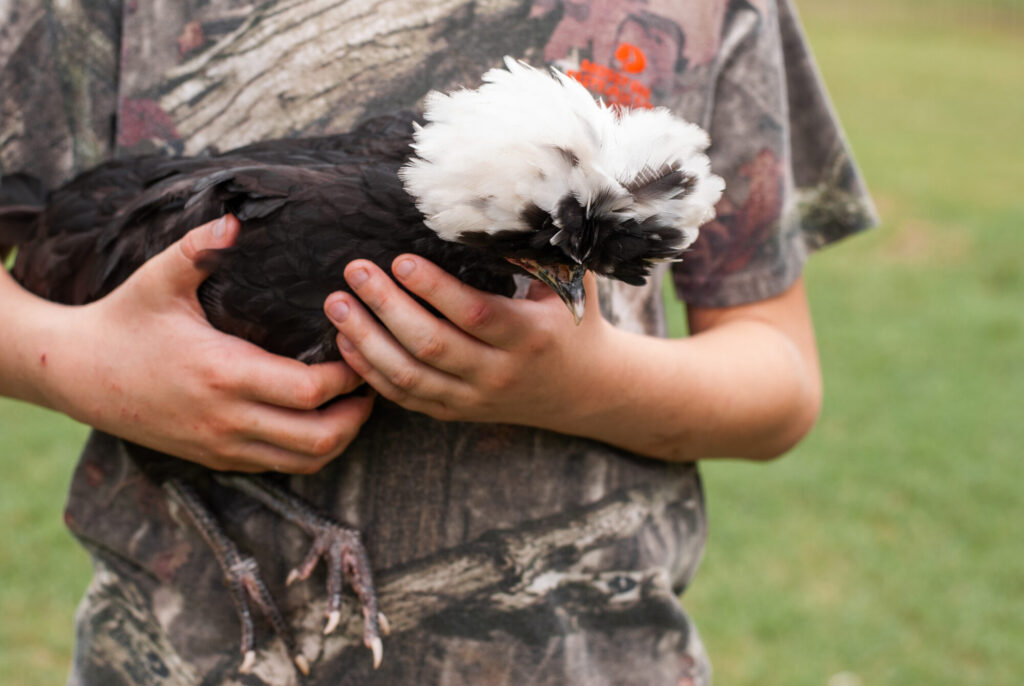
Chickens show their love and affection for you in a variety of ways.
If you’re wondering how chickens show you affection, there are several behaviors you can look for.
Running to you
One of the ways that chickens show affection is by running to you when they see you coming. Chickens can be very skittish and untrusting animals when it comes to humans. After all, we are a lot bigger than them. If they run to you, that means that they trust you and want to be around you.
Preening next to you
As I mentioned before, preening together for chickens displays trust and affection. Chickens will only perform this vulnerable task around those they trust. If a chicken is preening and grooming around you, it means they’re comfortable with you. Watch them for this behavior!
Sitting in your lap
A chicken will sit in your lap if they are comfortable with you. This shows a lot of trust. Lap chickens are my favorite ones because it’s a human-like display of affection. A lot like a dog will do.
I have found that if you are standing over the chicken, or sitting much higher, she may not jump on your lap. Try sitting on the ground near them and being very still. Quick movements may scare her away.
She is more likely to sit in your lap in this position. After getting used to that, she will be more comfortable sitting in your lap at other times too.
I have chickens that not only love my lap but also love to roost on my shoulder. Once they are comfortable don’t be surprised if they climb all over you!
Gently pecking you
As I’ve mentioned several times above, chickens show affection with their grooming habits. If a chicken is fond of you they may show you some love pecks. These are gentle pecks on your clothes or skin. The gentle pecks are their way of grooming you, and therefore giving you their trust and affection.
Oftentimes, my flock will come up and peck at my shoes. They’re use the treats I bring, but they’re also telling me hello.
Allowing you to pet them or groom them
If a chicken has a lot of trust and affection for you, she’ll allow you to groom her in return. You’ll be able to gently stroke her feathers, and give her a scratch on the back of her neck.
I use this time to inspect my hens for any parasites, wounds, or other issues that could cause her harm.
They also like for you to gently rub or massage their waddles. Many chickens will close their eyes during this time because it feels very good to them.
If you have a few special hens that like to follow you around the barnyard when you come out, they are showing you love.
Following you around
It’s true that they also expect treats, but they would run in the opposite direction of you if they felt threatened.
My oldest hen, Henny-Penny, will find me while I’m out working in the yard and follow me around. She’s letting me know that she enjoys foraging around me and trusts being in my presence.
I always take this as a sure sign of affection from a hen. Chickens are very social creatures and love being around flock members and you.
Lightly clucking at your feet
Sometimes a chicken will show affection towards you by lightly clucking at your feet. There are a couple of my girls who may not get in my lap, but they will come to me and chatter at my feet.
Usually, their behavior will progress and they will become more comfortable with you. It just has to be on their own terms. And sometimes clucking at your feet is all the affection they want to show. Either way, this small gesture is a great way for them to show they trust you.
Clucking at your feed might also be their way of sharing a special treat with you.
Chickens communicate through different sounds. They will give a low cluck to let you know there is food there. If you’ve ever watched a dominant rooster within a flock, he makes a special sound when he finds food.
The hens in the flock will come running when they hear this sound. This is his way on ensuring his girls are well fed and taken care of. In the same way a chicken might cluck near you to share a treat with you.
Signs That Let You Know Your Chickens Are Happy
Happy chickens show their contentment in several ways:
- Relaxed body language – They move around relaxed, pecking, scratching, and sunbathing. Even though young chicks are often more jumpy and reactive than adult hens, they’ll still be going about their daily activities unstressed.
- Gentle clucking sounds – Gentle soft clucks are one way you can tell if they’re happy. They will softly and affectionately communicate with their friends in the flock. This is not to be confused with their egg song which will often be loud noises coming from the coop. Soft clucks are going to be unique to every chicken and will hold their own special meaning.
- Dust bathing and preening – Chickens enjoy rolling in the dirt. This helps to remove external parasites and keeps their bodies clean. They’ll also preen their feathers using an oil gland on their body. They spread the oil all over to protect their fathers. Doing this makes them vulnerable as they aren’t alert for predators while they are bathing. They’ll only do these types of behaviors around other chickens or people they trust and are comfortable with. A chicken preening or dust bathing near you is a sign of trust and affection.
- Roosting together – They sleep next to the flock mates they share special bonds with. Roosting together is a sign of trust and comfort. If you notice a few chickens hanging out together and roosting together in the chicken coop, it’s likely they are best friends and are happy being together.
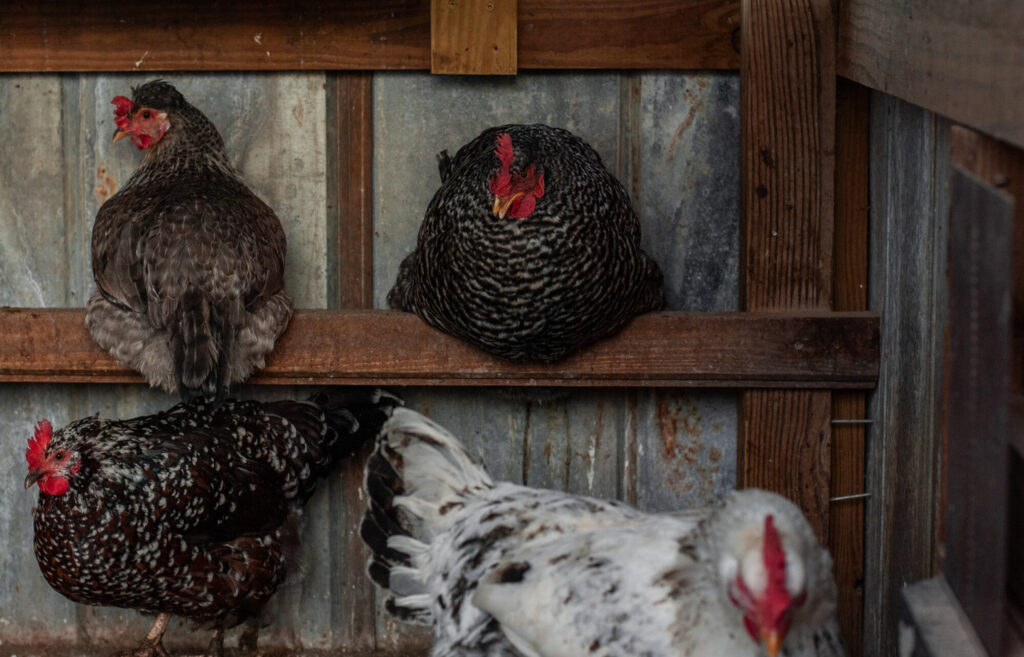
The Submission Squat – A Big Sign of Trust
One of the biggest visual displays that shows a chicken trusts you is a submission squat. The submission squat or “lordosis” is when a hen crouches low to the ground and spreads her wings out. She will stay in this position as you approach her.
This squat is usually reserved for potential mates and is a sign that she is being submissive. You can tell if young birds are ready to mate by observing this behavior.
If your hen is squatting around you, it means she sees you as a protector or a dominant. It’s a great sign that she feels safe around you.
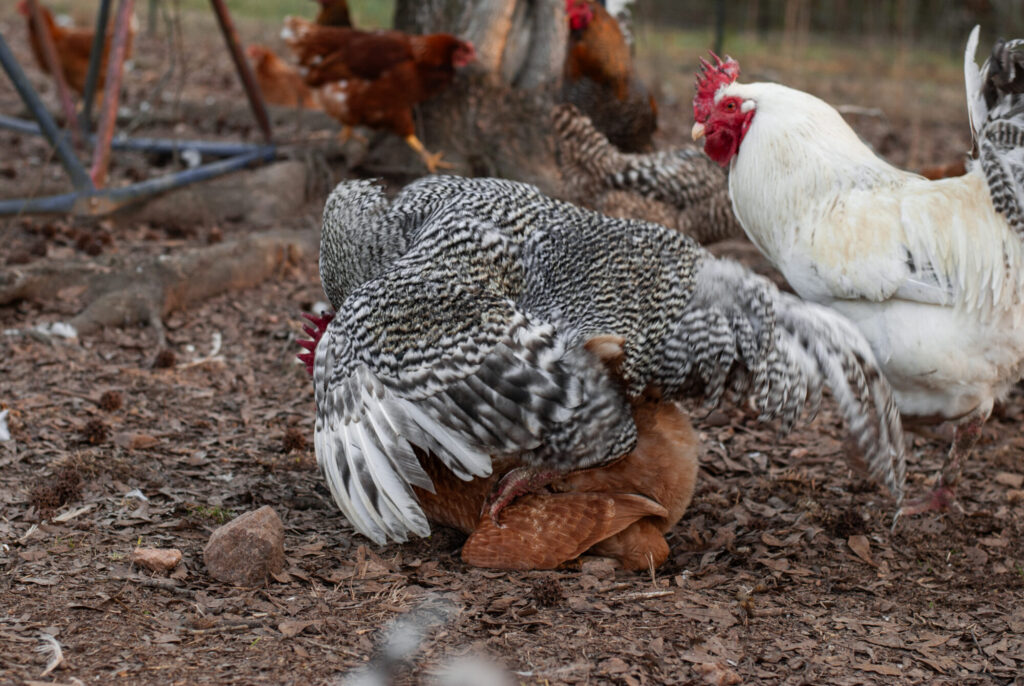
How to Gain a Chicken’s Affection
If you want your chickens to love and trust you, follow these steps:
- Be patient – Let them get used to you at their own pace. Remember that you are bigger than your bird. She may be frightened or feel scared of you. Allow your chickens to warm up to you on their own terms. You can’t force It. Make slow movements when you’re around them so you don’t scare them away.
- Offer treats – Chickens love snacks like mealworms, corn, fruit, or leftover vegetable scraps. Bringing your flock a little treat when you come out to visit is a great way to let them know that you are safe and someone they want to see.
- Spend time with them – Sit nearby and talk to them in a gentle voice. Chickens recognize voices and faces. They have a lot more cognitive abilities than we give them credit for. Spending time with them daily is the easiest way to earn their trust and affection.
- Handle them gently – Pick them up carefully and avoid making sudden movements. Speak softly and don’t make any loud noises that will startle them. A calm chicken will earn your trust faster than a frightened chicken.
- Provide food, water, and shelter – Healthy chickens are trusting chickens. A chicken can’t develop a bond with you if their basic needs aren’t being met. They will become sick and unwilling to socialize. Be sure to provide your flock with adequate shelter, water, and space. Want to know how big of a coop you need.?Check out my post on the square footage needed for your flock’s size.
- The Breed of Chicken Matters– Some chicken breeds are just friendlier than others. Choosing a friendly breed will help you gain their affection and trust more easily than a flighty breed. In my personal experience, some of the friendliest chicken breeds are: Orpingtons, Australorps, Polish, Silkie, and Cochin.
Here are some traits to look for in a friendly chicken:
Purpose: Egg-laying breeds like Leghorns can be flighty. They may not be the friendliest choice for your flock. Also, Breeds bred for fighting are likely to not be very friendly either.
History: If you hand-raise a chicken from a little chick, they are likely to be friendly. Where chickens that were not raised by humans or have had very little direct contact with humans like an ex-battery hen will likely not be as friendly.
Individual personalities: Each chicken, regardless of breed, will have an individual personality. Some chickens will be more trusting and lovable than others.
At the end of the day, earning a chicken’s trust and affection is going to depend on a lot of factors. There’s so set formula to making it work. I’ve owned hundreds of chickens in my backyard flock and have had a unique experience with all of them.
Some will warm up very quickly and will enjoy being around you, while others will always have a little bit of fear and anxiety when you’re around. Your job as a chicken owner is to ensure that the flock is happy, healthy, and safe. They will have a happy life as long as those needs are being met!
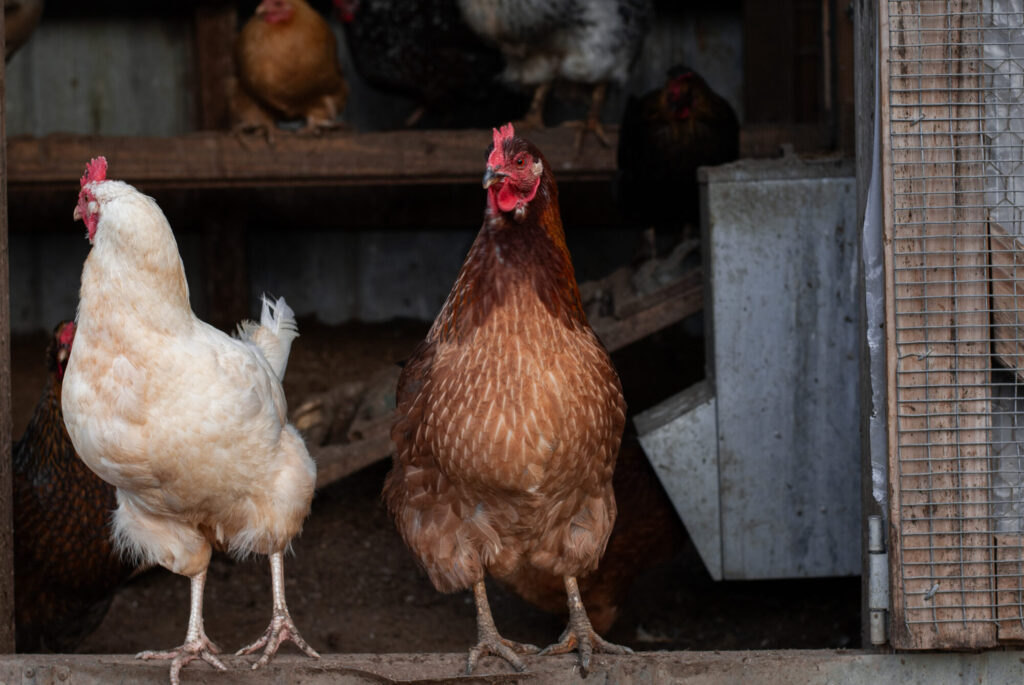
FAQs
How do you let a chicken know you love them?
You can show your chicken love by bringing them treats when you visit them. Visit them often so they are comfortable around you. Move slowly, and don’t make any sudden movements. Touch them gently, don’t’ chase them around. Allow them to come to you first.
Do chickens know their names?
Chickens may not necessarily know their names, but they recognize voices and pitch. If you call your chickens them say way (using the same tone), they will recognize it’s you and come running for treats. Personally, I call all of my chickens by their names differently. They do recognize when I’m calling them.
Why do chickens close their eyes when you pet them?
For the chicken, closing their eyes is s sign of comfort and relaxation. They might close their eyes while you are petting them because they are relaxed and feel safe with you. Just like other animals, some chickens also enjoy calm and soothing touch.
Do chickens bond with each other?
Yes, chickens will form strong bonds with each other. They will even mourn when their friend dies or leaves. It’s important for you to keep several chickens at a time so they won’t be lonely if something happens to their friend.
Final Thoughts on How Chickens Show Affection
Chickens are intelligent, affectionate animals that form deep social bonds. They show love in their own special ways, whether it’s following you around, cuddling, or making soft cooing sounds. If you treat them with kindness, patience, and plenty of tasty treats, they’ll come to trust and adore you. So, if you ever doubted that chickens can show affection, now you know they can, and they do!
If you enjoyed this chicken article, please share it!

More From The Farm
Owning your own flock of chickens is a great way to provide a sustainable food source as well as decrease your kitchen waste. Not to mention, they’re just cute and fun to own.
However, hatching and brooding baby chickens isn’t exactly the easiest part of owning chickens. That’s why I love having a broody hen in my flock. She does the hard work for me.
Learn more about why I love a broody hen!
Leave a Reply